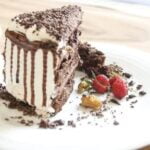Are you looking to take your cake decorating skills to the next level? In this article, we will explore the art of decorating cakes with frosting tips. From essential tools to advanced techniques, you will learn everything you need to know to create stunning designs on your cakes.
From swirls and rosettes to intricate piping details, mastering the use of frosting tips is key to achieving professional-looking cakes. Whether you are a beginner or an experienced baker, understanding how to decorate cake with frosting tips can elevate your creations and make them truly memorable.
In the following sections, we will delve into the essential tools needed for cake decorating, tips for preparing your cake before decorating, different types of frosting and which tips work best with each, basic and advanced frosting techniques, troubleshooting common problems, and even showcase some inspirational cake designs created using frosting tips. So grab your piping bag and let’s get started on this delectable journey into the world of cake decorating.
Essential Tools
When it comes to decorating a cake with frosting, having the right tools and equipment is essential to achieve professional-looking results. Here is a detailed list of must-have frosting tips and equipment to help you elevate your cake decorating game:
Piping Bags
Piping bags are a basic necessity when it comes to using frosting tips for cake decoration. These disposable or reusable bags come in various sizes and materials, such as plastic or cloth, to accommodate different types of frosting and designs. Make sure to have a few on hand so you can easily switch between colors or frosting consistencies.
Frosting Tips
There are numerous types of frosting tips available, each creating unique designs and textures on cakes. Some popular options include round tips for outlining and writing, star tips for creating swirls and rosettes, and leaf tips for adding foliage accents. Invest in a variety of sizes and shapes to give yourself more versatility in your designs.
Turntable
A turntable is a revolving platform that allows you to smoothly rotate your cake while decorating, making it easier to apply even coats of frosting and create intricate designs. This tool is especially useful for achieving smooth finishes on the sides of the cake. Look for a sturdy turntable that can support the weight of your cake without wobbling.
By ensuring you have these essential tools on hand, you’ll be well-equipped to decorate cakes with frosting tips like a pro. Experiment with different techniques and designs to discover your own unique style and wow your friends and family with beautifully decorated creations.
Preparing Your Cake
Baking the Perfect Cake
Before you can even think about decorating your cake with frosting tips, you need to ensure that you have a perfectly baked cake as your canvas. Start by preheating your oven to the right temperature and preparing your baking pans with parchment paper or grease and flour. Make sure to accurately measure out all your ingredients and follow the recipe instructions carefully to avoid any issues with the final cake.
Cooling Your Cake Properly
Once your cake is baked to perfection, it’s crucial to cool it properly before attempting any frosting decorations. Allow the cake to cool in the pan for a few minutes before transferring it onto a wire rack to cool completely. This ensures that the moisture in the cake is evenly distributed and prevents any condensation from forming on the surface, which can affect how well the frosting adheres later on.
Leveling and Trimming Your Cake
Before you start applying frosting with your tips, consider leveling and trimming your cake for a smooth surface. You can use a serrated knife or a special cake leveler tool to remove any domed top and create an even layer for frosting. Remember that a flat and even base will make it easier for you to achieve clean lines and designs when using frosting tips on your cake.
Types of Frosting
When it comes to decorating cakes with frosting, the type of frosting you use can make a big difference in the final result. There are several different types of frosting to choose from, each with its own unique texture and flavor. Here is a breakdown of some popular frosting types and which tips work best for each:
- Buttercream Frosting: Buttercream is a classic choice for cake decorating, known for its smooth texture and easy spreadability. It can be used with a variety of tips to create different designs, such as rosettes, borders, and writing. Round tips (such as Wilton tip #12) are great for creating simple swirls and dots with buttercream frosting.
- Royal Icing: Royal icing is a versatile frosting that dries hard, making it ideal for intricate designs and decorations. Thin round tips (like Wilton tip #1 or #2) are perfect for piping fine lines and details with royal icing. This type of frosting is often used for piping flowers, intricate patterns, and writing on cakes.
- Cream Cheese Frosting: Cream cheese frosting has a tangy flavor that pairs well with carrot cake, red velvet cake, and other desserts. Because of its softer consistency compared to buttercream, it’s best used with larger open star tips (such as Wilton tip #1M) to create beautiful rosettes and swirls on cakes.
Experimenting with different frosting types can help you discover your favorite flavors and textures for decorating cakes. Don’t be afraid to mix and match different frostings with various tips to create unique designs that reflect your personal style. Explore various tutorials online or attend cake decorating classes to enhance your skills in using different types of frostings with specific tips.
Remember, practice makes perfect when it comes to mastering the art of cake decorating with frosting tips. Enjoy the process of creating beautiful designs on your cakes while experimenting with different frostings and techniques. With dedication and creativity, you can impress your friends and family with stunning cake creations that showcase your newfound skills in using frosting tips effectively.
Basic Frosting Techniques
Decorating a cake with frosting tips can seem daunting at first, but with the right techniques and a little practice, you can create beautiful designs that will impress your friends and family. One of the key things to keep in mind when using frosting tips is the consistency of your icing.
If it’s too stiff, it can be difficult to pipe, while if it’s too runny, your design may not hold its shape. Aim for a smooth and creamy texture that holds its shape when piped.
To begin decorating your cake, start by preparing your frosting and transferring it to a piping bag fitted with the desired tip. For basic designs like rosettes, stars, and swirls, a round tip or star tip works well.
Hold the piping bag at a 90-degree angle to the surface of the cake and gently apply pressure to pipe out the frosting in your desired pattern. Practice on a piece of parchment paper before moving onto your cake to get a feel for how much pressure to apply.
When creating borders on your cake, use a petal tip or leaf tip for added dimension and texture. These tips can create ruffles or leaves around the edges of your cake that add an elegant touch.
For more intricate designs like flowers or lace patterns, consider investing in specialty tips that can help you achieve these detailed looks. Remember that practice makes perfect when it comes to cake decorating, so don’t be discouraged if your first attempts aren’t flawless – keep trying and experimenting with different tips and techniques until you find what works best for you.
| Cake Decorating Tip | Description |
|---|---|
| Practice piping on parchment paper | Helps you get comfortable with the pressure needed for different designs |
| Use petal or leaf tips for borders | Adds dimension and texture to the edges of your cake |
| Invest in specialty tips for intricate designs | Allows you to create detailed looks like flowers or lace patterns |
Advanced Frosting Techniques
Once you have mastered the basic frosting techniques, it’s time to take your cake decorating skills to the next level with more advanced frosting techniques. These techniques allow you to create intricate designs that will impress your friends and family. One of the keys to success in advanced cake decorating is using the right frosting tips for the job.
When it comes to advanced frosting techniques, there are a few key tips and tricks to keep in mind. First, make sure you are using the right consistency of frosting for the design you’re trying to achieve.
A stiffer frosting works best for intricate designs that require precise piping, while a softer frosting is better for creating smooth surfaces or watercolor effects. Additionally, always practice on a separate surface before working on your actual cake to ensure you have the technique down.
To create stunning and intricate designs on your cakes, consider investing in specialty frosting tips such as petal tips, leaf tips, or star tips. These tips allow you to create lifelike flowers, delicate leaves, or textured accents that will take your cake decorating game to the next level. Experiment with different tip sizes and shapes to discover which ones work best for the designs you want to create.
| Key Points | Details |
|---|---|
| Consistency of Frosting | Use stiff or soft frosting depending on design |
| Practice Makes Perfect | Try out techniques on a separate surface first |
| Specialty Frosting Tips | Invest in petal tips, leaf tips, and star tips for intricate designs |
By incorporating these advanced frosting techniques into your cake decorating repertoire, you’ll be able to create show-stopping cakes that look as good as they taste. Don’t be afraid to push yourself out of your comfort zone and experiment with new designs – after all, practice makes perfect. With dedication and patience, you’ll soon become a master at decorating cakes with frosting tips.
Troubleshooting
When it comes to decorating cakes with frosting tips, sometimes things don’t go as smoothly as planned. But don’t worry, troubleshooting common frosting tip problems is part of the learning process, and with a few simple solutions, you can quickly turn things around. One of the most common issues that decorators face is air bubbles in the frosting.
These pesky bubbles can create an uneven texture on your cake and make it challenging to achieve a smooth finish. To fix this problem, try gently tapping the filled piping bag on the countertop to release any trapped air before starting to decorate.
Another frequent problem when using frosting tips is clogging. This can happen when your frosting is too thick or contains lumps that make it difficult for the icing to flow smoothly through the tip.
To prevent clogging, make sure to sift your powdered sugar before mixing it into the buttercream and avoid adding too much coloring gel, which can also cause blockages in the tip. If your piping bag does get clogged during decorating, simply remove the tip, clean it out, and continue decorating.
Sometimes decorators may find that their frosting begins to melt or lose its shape while working on intricate designs. This can be especially frustrating when trying to achieve detailed decorations or lettering on a cake. To avoid this issue, make sure your work area is not too warm or humid, as this can cause the frosting to soften too quickly.
You can also place your piping bags in the refrigerator for a few minutes between decorating sessions to help firm up the icing and maintain its shape. With these troubleshooting tips in mind, you’ll be better equipped to handle any challenges that come your way while decorating cakes with frosting tips.
Inspiration Gallery
When it comes to cake decorating, the possibilities are truly endless. With the right frosting tips and a bit of creativity, you can create stunning designs that will wow your friends and family. In this section, we’ll showcase some inspirational cake designs that were created using frosting tips. Whether you’re a beginner or an experienced decorator, these designs will surely spark your imagination and motivate you to try new techniques.
Here are some stunning cake designs that demonstrate the artistry and skill that can be achieved with frosting tips:
- A beautiful floral cake adorned with intricate buttercream flowers
- A whimsical unicorn cake with swirls of pastel-colored frosting
- An elegant ombre cake featuring gradient shades of frosting for a chic look
- A festive holiday-themed cake decorated with piped snowflakes and edible glitter
Looking at these gorgeous creations, you may be wondering how you can achieve similar results with your own cakes. Don’t worry – with the right tools, practice, and a touch of patience, you can decorate cakes like a pro. Here are some tips on how to decorate cakes with frosting tips to help you get started:
- Start by choosing the right frosting tip for the design you have in mind. Different tips create different textures and patterns, so experiment with various sizes and shapes.
- Practice piping on a flat surface before moving on to your cake to get a feel for the pressure needed to achieve smooth lines and swirls.
- Make sure your frosting is at the right consistency – too stiff and it won’t pipe smoothly, too runny and it will lose its shape. Adjust as needed by adding more powdered sugar or liquid.
With these tips in mind, grab your frosting tips and get ready to unleash your creativity. The only limit is your imagination when it comes to decorating cakes with frosting tips.
Conclusion
In conclusion, mastering the art of cake decorating with frosting tips can open up a world of creativity and delicious possibilities. By having the essential tools, preparing your cake properly, understanding different frosting types, and practicing basic and advanced techniques, you can elevate your cake decorating game to impressive levels. Whether you’re a baking enthusiast looking to hone your skills or a beginner eager to learn the ropes, there is something for everyone in the realm of cake decorating.
Remember, practice makes perfect when it comes to using frosting tips. Don’t be afraid to experiment with different designs and techniques to find what works best for you. And if you encounter any troubleshooting issues along the way, refer back to our guide for solutions on how to fix common frosting tip problems. The key is to not get discouraged by challenges but rather embrace them as opportunities for growth and improvement in your decorating skills.
So why not gather your tools, bake a delicious cake, whip up some frosting, and let your creativity run wild? Explore new ideas, draw inspiration from our gallery of stunning cake designs created using frosting tips, and most importantly, have fun in the process. With dedication and patience, you’ll soon discover just how rewarding and enjoyable it can be to decorate cakes with frosting tips. Happy decorating.
Frequently Asked Questions
How Do You Use Cake Frosting Tips?
Cake frosting tips are essential tools for creating beautiful designs on cakes and cupcakes. They come in various shapes and sizes, allowing you to pipe out different patterns like flowers, stars, or rosettes. To use them effectively, fill a piping bag with frosting, attach the desired tip, and apply consistent pressure to create your design smoothly.
What Is the Easiest Piping Tip for Beginners?
For beginners in cake decorating, the easiest piping tip to start with is the round tip. This versatile tip is simple to use and can create classic designs like dots, lines, and writing on cakes. It’s a great choice for practicing basic piping techniques before moving on to more intricate tips like the star or petal tips.
What Are the Best Tips for Cake Decorating?
When it comes to cake decorating tips, there are a few key recommendations that can help elevate your creations. First, always make sure your buttercream or frosting is at the right consistency for piping – not too stiff or too runny.
Another important tip is to practice good hand control and pressure when piping to ensure smooth and consistent designs. Additionally, take your time when working on intricate details and don’t be afraid to experiment with different tips and techniques to find what works best for you.

Welcome to my blog about home and family. This blog is a place where I will share my thoughts, ideas, and experiences related to these important topics. I am a stay-at-home mom with two young children. I hope you enjoy reading it! and may find some helpful tips and ideas that will make your home and family life even better!





